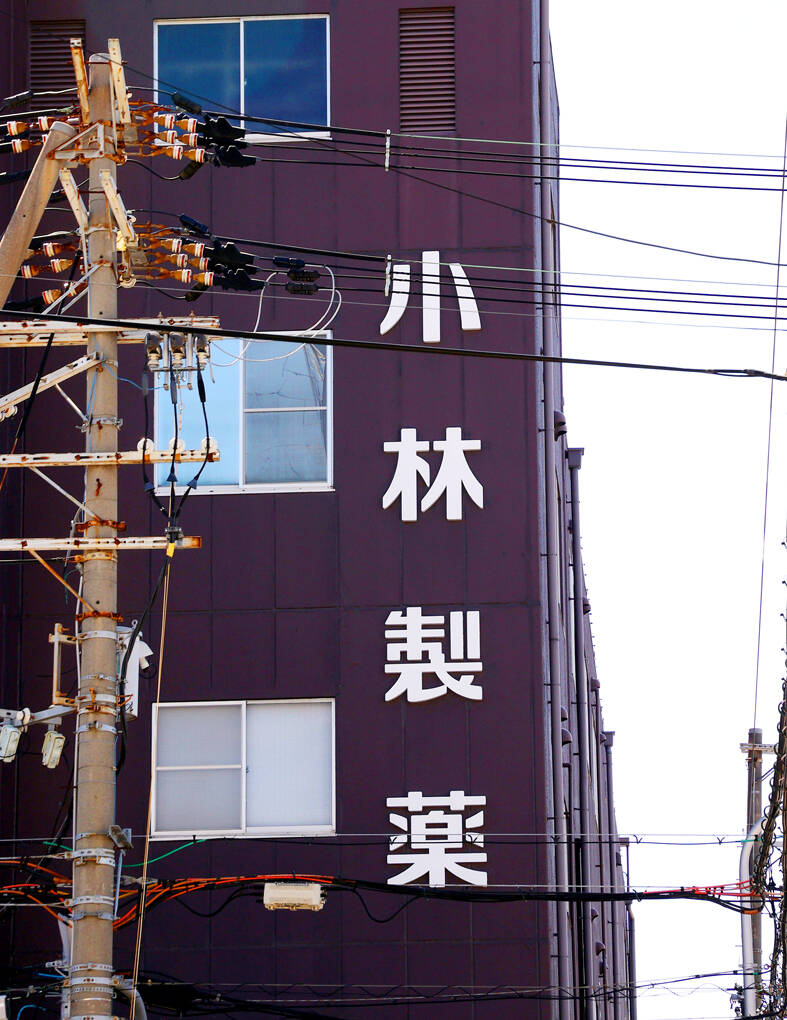The number of products that used red yeast rice produced by Japanese drugmaker Kobayashi Pharmaceutical Co, which is being investigated for a suspected link to kidney disease and being preemptively recalled, has increased to 226 in Taiwan.
The Food and Drug Administration (FDA) on Monday last week issued an emergency recall of red yeast rice supplements from Kobayashi, citing the Osaka-based drugmaker on March 22 saying that its nutritional supplements containing red yeast rice might cause kidney problems, as it had received many reports indicating this was the case.
There were no import records of the five types of supplements that Kobayashi issued a recall on, but two Taiwanese importers of red yeast rice products made by Kobayashi had imported 56 batches between Jan. 1, 2022 and March 22, the FDA said.

Photo: EPA-EFE/JIJI PRESS
The two companies are pre-emptively recalling their products containing the red yeast rice ingredient, the agency said, adding that it has suspended applications for import inspection on Kobayashi’s red yeast rice ingredients and products.
The FDA also urged all food businesses that have used Kobayashi’s red yeast rice ingredients and products to stop using or selling them, and remove them from shelves.
They should report to the health authority, as required under the Act Governing Food Safety and Sanitation (食品安全衛生管理法), or face a fine of between NT$30,000 and NT$3 million (US$938 and US$93,780).
In Japan, Kyodo News reported that the drugmaker on Friday said that it has confirmed a fifth death possibly linked to its red yeast rice dietary supplements, and that it detected puberulic acid, a natural compound made from blue mold, in ingredients, and that the substance might have caused health problems for more than 100 people who reported falling ill after taking the supplements.
Meanwhile, FDA Deputy Director-General Lin Chin-fu (林金富) on Saturday confirmed that the agency received three reports of “unexpected reactions to food” associated with Kobayashi’s red yeast rice ingredient.
The FDA said yesterday afternoon that the number had increased to six as of 1pm yesterday.
The people reported feeling ill, but whether they have symptoms or a disease related to the supplements still needs further investigation, the agency said, adding that it would gather data for the consultative committee to assess the associations between the supplements and the unexpected reactions.
As of yesterday, the FDA’s data showed that the number of products in Taiwan that used Kobayashi’s red yeast rice ingredient and are being pre-emptively recalled has increased to 226.
A list of the products being recalled is available on the FDA’s Web site at: www.fda.gov.tw/tc/siteContent.aspx?sid=12919.
The FDA said consumers who have purchased products that used Kobayashi’s red yeast rice ingredient and have questions about it could call the FDA’s food safety hotline at 1919 or the consumers protection hotline at 1950.
People who felt ill after taking supplements that used Kobayashi’s red yeast rice ingredient could report their case to the FDA’s “unexpected reactions to health foods, nutrient foods, and capsules or tablet foods reporting platform” (http://qms.fda.gov.tw/tcbw/index.jsp) or call (02) 2321-0594, it said.
Additional reporting by CNA

TRAFFIC SAFETY RULES: A positive result in a drug test would result in a two-year license suspension for the driver and vehicle, and a fine of up to NT$180,000 The Ministry of Transportation and Communications is to authorize police to conduct roadside saliva tests by the end of the year to deter people from driving while under the influence of narcotics, it said yesterday. The ministry last month unveiled a draft of amended regulations governing traffic safety rules and penalties, which included provisions empowering police to conduct mandatory saliva tests on drivers. While currently rules authorize police to use oral fluid testing kits for signs of drug use, they do not establish penalties for noncompliance or operating procedures for officers to follow, the ministry said. The proposed changes to the regulations require

The Executive Yuan yesterday announced that registration for a one-time universal NT$10,000 cash handout to help people in Taiwan survive US tariffs and inflation would start on Nov. 5, with payouts available as early as Nov. 12. Who is eligible for the handout? Registered Taiwanese nationals are eligible, including those born in Taiwan before April 30 next year with a birth certificate. Non-registered nationals with residence permits, foreign permanent residents and foreign spouses of Taiwanese citizens with residence permits also qualify for the handouts. For people who meet the eligibility requirements, but passed away between yesterday and April 30 next year, surviving family members

China Airlines Ltd (CAL) yesterday morning joined SkyTeam’s Aviation Challenge for the fourth time, operating a demonstration flight for “net zero carbon emissions” from Taiwan Taoyuan International Airport to Bangkok. The flight used sustainable aviation fuel (SAF) at a ratio of up to 40 percent, the highest proportion CAL has achieved to date, the nation’s largest carrier said. Since April, SAF has become available to Taiwanese international carriers at Taipei International Airport (Songshan airport), Kaohsiung International Airport and Taoyuan airport. In previous challenges, CAL operated “net zero carbon emission flights” to Singapore and Japan. At a ceremony at Taoyuan airport, China Airlines chief sustainability

‘ONE CHINA’: A statement that Berlin decides its own China policy did not seem to sit well with Beijing, which offered only one meeting with the German official German Minister for Foreign Affairs Johann Wadephul’s trip to China has been canceled, a spokesperson for his ministry said yesterday, amid rising tensions between the two nations, including over Taiwan. Wadephul had planned to address Chinese curbs on rare earths during his visit, but his comments about Berlin deciding on the “design” of its “one China” policy ahead of the trip appear to have rankled China. Asked about Wadephul’s comments, Chinese Ministry of Foreign Affairs spokesman Guo Jiakun (郭嘉昆) said the “one China principle” has “no room for any self-definition.” In the interview published on Thursday, Wadephul said he would urge China to